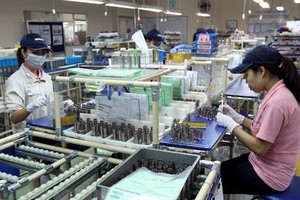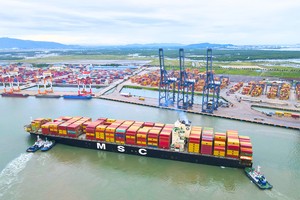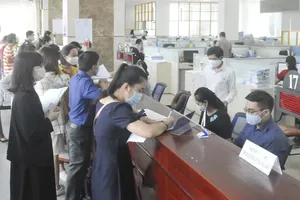Budget deficit for 2022’s estimate
According to the national budget estimate in 2022 approved by the National Assembly, the total revenue is VND1,411,700 billion (about US$62.54 billion) and total expenditure is VND1,784,600 billion (US$78.97 billion), equivalent to a 4 percent GDP deficit. The total budget revenue in 2022 is equivalent to 15.1 percent of GDP, lower than 2021’s 15.6 percent, and much lower than 2020’s forecast of 22.2 percent.
Due to Covid-19, the major population’s purchasing power and income plummeted, and small businesses and sole proprietorship ran into financial difficulties in 2021. Therefore, policies aimed to reduce the national budget intake through tax cuts will stimulate consumption, create a consumption market for domestic products, and partly curb the risk of inflation due to high import prices.
Reducing revenue, increasing spending will stimulate economic recovery
Specifically, a mere 2 percent reduction on VAT on the 2022 estimated revenue of VND351,513 billion (US$15.55 billion) will have a spillover effect on the consumer market many times stronger than corporate income tax (CIT) exemption and reduction policy. Accordingly, the total national budget revenue should be reduced to 14-14.5 percent of GDP through tax and fee exemption and reduction policies, instead of delaying CIT and land use fee as done in 2020 and 2021.
Reports have shown that the tax burden has increased and the national budget collection policy has not reflected the goal of stimulating domestic production. Specifically, the budget revenue in 2021 exceeded the estimate despite economic declines, and the 2022 revenue estimate from import and export increased by 11.5 percent. Meanwhile, the non-state economic sector in 2025 is still expected to increase 6.4 percent compared to the 2021 estimate.
Similarly, the estimated 2022 national budget expenditure policy also shows the lack of favorable policies necessary to stimulate economic recovery. Total budget expenditure is estimated at 19.1 percent of GDP, lower than 2021’s 19.6 percent of estimated GDP and 2020’s 25.6 percent, while the ideal rate should be up at least 22 percent of GDP. Estimated development investment spending from the 2022 budget has increased by 10.2 percent to over VND526,000 billion (US$23.26 billion) compared to the 2021 estimate, which is in line with the requirements of socio-economic development.
However, if projects with investment from the budget are executed on time and avoid extractions and slow disbursement, it is possible to make up for most of the expenditure increase for public investment in modern infrastructure. In addition, although the recurrent expenditure estimate in 2022 is 7.2 percent higher than in 2021, the expenditure on wage reform in 2022 is only VND1,000 billion (US$44 million), which does not meet requirements to improve the income and purchasing power for a portion of the population.
Loosening fiscal policies for monetary policies to follow
Because both the national budget revenue and expenditure estimates in 2022 have not shown a clear loosening of fiscal policy for socio-economic recovery, the budget deficit is still at 4 percent of GDP, equivalent to the projected deficit of VND372,900 billion (US$16.50 billion). If the fiscal policy is definitely loosened, the 2022 national budget may be overspent by 7-8 percent of GDP.
Estimated principal and interest payments in 2022 are far lower than the 2020 and 2021 estimates, while the total loan amount is expected to be VND572,686 billion (US$25.32 billion), nearly 6 percent lower than the 2021 estimate. Doubling the budget deficit should be considered, so that the total loan amount would be about VND950,000 billion (US$41.98 billion), equivalent to 10 percent of GDP.
Thus, the strong loosening of fiscal policies in 2022 will be the pillar to promote socio-economic recovery, while the monetary policy will be loosened within the boundaries of stabilizing the macro-economy and flexible timing, with the goal of limiting inflation around 4-5 percent and core inflation around 2 percent.
Accordingly, the total means of payment in 2022 needs to increase by 10 percent and total economic credits by 12-15 percent to meet the society’s capital needs. Credit policy should be extended and certain consumption policies promoted to improve purchasing power. The credit flows should be directed into production and business, and limit the flow into risky endeavors like stocks, shares and corporate bonds.
In addition, monetary policies also need to be improved soon so that credit institutions can participate more effectively in government bonds, debt trading, corporate bonds and real estate. This will inevitably cause the bad debt ratio at credit institutions to increase in 2022; therefore, enforcing regulations on bad debt settlement is the key to ensuring their operation.
On the other hand, the interest rate policy in 2021 remained high despite having been slightly reduced, especially when the whole year’s CPI only reached 2%. The average short-term lending interest rate in VND for a number of priority sectors is at 4.4 percent per year, lower than the maximum 4.5 percent per year prescribed by the State Bank. Therefore, the average lending interest rate in VND in 2022 should be adjusted down by 1-2 percent for all terms, coupled with cost reduction and the use of modern technology in customer transactions.
In short, interest rate reduction in 2022 should be implemented consistently, widely and equally. CPI and core inflation in 2021were too low and considered a failure of the monetary policy. Besides, the USD price index decreasing by about 1 percent is also detrimental to exports in 2021. Reducing interest rates and devaluation of VND against USD and other strong foreign currencies must be the main focus of 2022’s monetary policy.
























